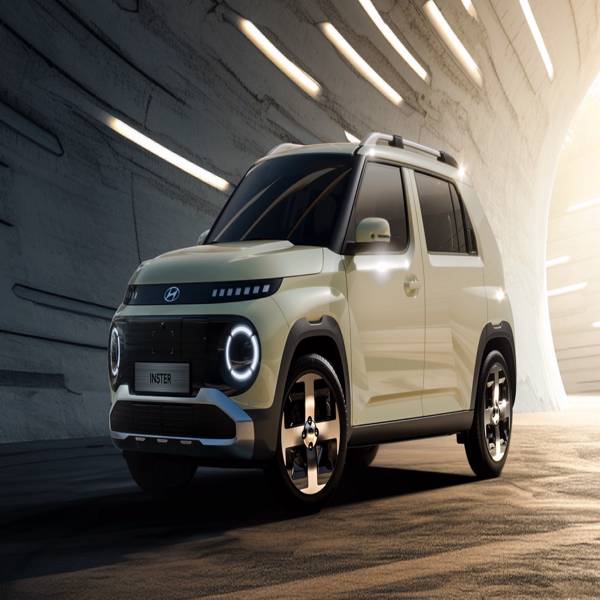Hyundai’s electric SUV aimed at competing with the Punch EV and eC3 is set to hit the road in late 2026.
Hyundai Motor India, facing strong competition from Tata Motors in the regular car market, is gearing up to take on the Indian carmaker in the high-volume electric vehicle market within the next two years.
Hyundai’s Electric Punch Competitor Arrives in 2026
- Hyundai is launching a new electric SUV to rival the Tata Punch EV. Codenamed HE1i, it’s expected to hit roads in late 2026.
- This SUV will be based on the recently unveiled Inster EV, but stretched for more space and battery capacity.
- Hyundai plans to build the HE1i at their Sriperumbudur plant in India, using locally sourced batteries from Exide.
- This strategy combines leveraging existing platforms (like the Creta EV) with dedicated electric car platforms (like the HE1i).
A Closer Look at the Hyundai Inster
- The Inster is derived from the Casper, a small SUV sold by Hyundai in other markets.
- It’s been extended by 230mm, with most of the extra space going to the battery pack.
- At 3,825mm long, the Inster is slightly smaller than the Tata Punch EV and Citroen eC3.
Hyundai’s Electric Punch Rival: Power, Features, and Production Plans
Powertrain Options:
- Just like the international Inster EV, the Indian HE1i is expected to offer two electric motor choices: 97hp and 115hp, both delivering 147 Nm of torque.
- Battery options will likely mirror the international model as well: a standard 42kWh pack for 300km range and a long-range 49kWh pack for 355km range (based on WLTP standards).
Tech and Features:
- Hyundai is known for packing its cars with features, and the HE1i seems to follow suit. Expect a dual-screen setup with 10.25-inch displays for the instrument panel and infotainment system.
- Safety features won’t be skimped on either, with a full suite of ADAS (Advanced Driver-Assistance Systems) likely to be included. Creature comforts like automatic climate control and a 360-degree camera with blind-spot monitoring are also anticipated.
Production and Sales Ambitions:
- Hyundai is aiming for high production volume with their electric vehicle lineup in India. Their target is roughly 90,000 units annually, with the Creta EV contributing 26,000 units and the compact HE1i SUV contributing a significant portion (around 65,000 units). It’s worth noting that a sizeable chunk of the HE1i production might be destined for export.
- The company is committed to investing heavily in electric vehicles for the Indian market. They’ve pledged Rs 20,000 crore over the next eight years. Hyundai also plans to adapt their EV strategy based on market demand, as indicated in their draft red herring prospectus (DRHP). This includes launching “appropriate models” and introducing four new electric vehicles in total, including a mass-market offering. Their popular Creta EV will be the first to launch by the end of the current financial year.
- Hyundai acknowledges they’re taking a phased approach, starting with premium EVs before gradually transitioning towards more affordable options as the Indian EV market matures.
Hyundai’s Expanding Electric Vehicle Plans for India
- Hyundai has confirmed production of the Creta EV and a compact electric SUV (likely based on the Inster EV).
- Decisions on electric versions of the Venue and Grand i10 Nios are still under evaluation by Hyundai.
- Hyundai was an early mover in the Indian EV market with imported models like the Kona Electric and Ioniq 5, but they’re looking to ramp up volume with locally produced options.
- The company believes its experience with successful gasoline cars in India will translate well to developing electric vehicles tailored for the Indian market. This includes potentially leveraging their global portfolio of various electric and hybrid vehicle technologies (xEVs) for India.
- Hyundai is aiming to compete with Tata Motors, the current leader in Indian EVs with a lineup of four models (Tiago, Tigor, Punch, Nexon). Tata is also adding new electric vehicles like the Curvv, Harrier EV, and Sierra EV in the coming years.
- Interestingly, Tata Motors seems open to more competition, believing it will help grow the overall Indian EV market.
Also read : Big Savings on the Maruti Grand Vitara this July!
- Tata Motors Faces Hyundai Challenge in Electric Vehicle Race
- Electric car leader Tata Motors, with a dominant 75% market share, now sees Hyundai Motor India hot on its heels. The gap between the two companies is a mere 30,000 units, setting the stage for an exciting electric vehicle battle. With the Indian passenger EV market expected to boom, this competition between Tata and Hyundai could determine who claims the crucial number 2 spot.



